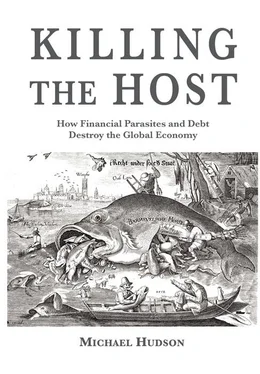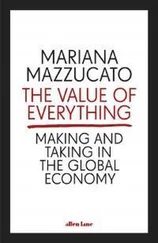2. Today’s banks don’t finance tangible investment in factories, new means of production or research and development — the “productive lending” that is supposed to provide borrowers with the means to pay off their debt. Banks largely lend against collateral already in place, mainly real estate (80 percent of bank loans), stocks and bonds. The effect is to transfer ownership of these assets, not produce more.
3. Borrowers use these loans to bid up prices for the assets they buy on credit: homes and office buildings, entire companies (by debt-leveraged buyouts), and infrastructure in the public domain on which to install tollbooths and charge access rents. Lending against such assets bids up their prices — Asset-Price Inflation.
4. Paying off these loans with interest leaves less wage or profit income available to spend on consumer goods or capital goods. This Debt Deflation is the inevitable successor to Asset-Price Inflation. Debt service and rent charges shrink markets, consumer spending, employment and wages.
5. Austerity makes it harder to pay debts, by shrinking markets and causing unemployment. That is why John Maynard Keynes urged “euthanasia of the rentier” if industrial capitalism is to thrive. He hoped to shift the focus of fortune-seeking away from banking, and implicitly from its major loan markets in absentee landlordship and privatization of rent-extracting monopolies.
6. Mainstream policy pretends that economies are able to pay their debts without reducing their living standards or losing property. But debts grow exponentially faster than the economy’s ability to pay as interest accrues and is recycled (while new bank credit is created electronically). The “magic of compound interest” doubles and redoubles savings and debt balances by purely mathematical laws that are independent of the economy’s ability to produce and pay. Economies become more debt-leveraged as claims for payment are concentrated in the hands of the One Percent.
7. Debts that can’t be paid, won’t be. The question is: how won’t they be paid? There are two ways not to pay. The most drastic and disruptive way (euphemized as “business as usual”) is for individuals, companies or governments to sell off or forfeit their assets. The second way to resolve matters is to write down debts to a level that can be paid. Bankers and bondholders prefer the former option, and insist that all debts can be paid, given the “will to do so,” that is, the will to transfer property into their hands. This is the solution that mainstream monetarist economists, government policy and the mass media popularize as basic morality. But it destroys Economy #1 to enrich the 1 percent who dominate Economy #2.
8. A Bubble Economy may postpone the collapse if banks lend on easier terms to enable borrowers to bid up prices for real estate and other assets. This inflation becomes the only way creditors can be paid as the economy becomes increasingly more debt-ridden. It enables debtors to pay their creditors by borrowing more against collateral becoming higher priced. Indeed, new lending and debt must grow exponentially to sustain this kind of bubble, just as new subscribers are needed to sustain a chain letter or Ponzi scheme.
After 2001, rising asset prices tempted homebuyers to borrow to buy assets, paying the interest by borrowing against their asset-price gains. But what seemed at first to be a self-inflating perpetual motion machine led to a crash when current income did not cover the interest charge. By 2007, speculators stopped buying and started to sell off property, crashing its price. The debts were left in place, causing negative equity.
9. Banks and bondholders oppose debt write-downs to bring debt in line with earnings and historical asset valuations. Creditor demands for payment run the economy in the interest of the financialized Economy #2 instead of protecting the indebted production-and-consumption Economy #1. The effect is to drive both economies bankrupt.
10. The financial sector (the One Percent) backs oligarchies. Eurozone creditors recently imposed “technocrats” to govern debt-strapped Greece and Italy, and blocked democratic referendums on whether to accept the bailouts and their associated austerity terms. This policy dates from the 1960s and ’70s when the IMF and U.S. Government began backing creditor-friendly Third World oligarchies and military dictatorships.
11. Every economy is planned. The question is, who will do the planning: banks or elected governments? Will planning and structuring the economy serve short-term financial interests (making asset-price gains and extracting rent) or will it promote the long-term upgrading of industry and living standards?
Banks denounce public investment and a tax shift off wages onto rentier wealth as “the road to serfdom.” But strong public regulation is needed to prevent economies from polarizing between debtors and creditors, and to block the financial sector from imposing austerity and setting the economy on the road to debt peonage.
12. The financial sector’s drive to increase its political power has a fatal fiscal dimension: Whatever economic rent that remains untaxed is “free” to be pledged to the banks as interest. Banks therefore advocate un-taxing real estate, natural resource rent and monopoly price gouging. This is the opposite from the classical policy of taxing and de-privatizing economic rent and asset-price (“capital”) gains.
Classical value and price theory demonstrates that a rent tax does not increase prices, but is paid out of rent, absorbing the excess of price over intrinsic cost-value. That was the policy aim of free market economists from the Physiocrats and Adam Smith through John Stuart Mill and the Progressive Era. By the late 19 thcentury it was called socialism, which originally meant freeing markets from the political legacy of feudal privileges to enclose the Commons and privatized public infrastructure.
1. The Financial Sector’s Rise to Power
A century ago nearly everyone expected that as prosperity and wage levels increased, people would save more and have less need to go into debt. In the 1930s John Maynard Keynes worried that the increasing propensity to save would lead people to spend less on goods and services, causing unemployment to rise unless public spending increased. Yet by 2008 the U.S. domestic saving rate fell below zero. Not only individuals but also real estate, industry and even government are becoming more indebted — or in economist-speak, “dis-saving.”
Trying to rise into the middle class these days is a road to debt peonage. It involves taking on mortgage debt to buy a home of one’s own, student loans to get the education needed to get a good job, an automobile loan to drive to work, and credit-card debt just to maintain one’s living standards as the debtor falls deeper and deeper in the hole. Many recent graduates find that they have to pay so much on their student loans that they must live at home with their parents and cannot afford to get married and start a family, much less qualify for a mortgage. That is why consumer spending has not risen since 2008. Even when income rises, many families find their paychecks eaten up by debt service.
That is what debt deflation means. Income paid to creditors is not available for spending on goods and services. In the 1930s, Keynes feared that as economies got richer they would save more of their income, causing a shortfall in market demand. The problem today is that “saving” is not a result of people having more income than they want to spend. National income statistics count as “saving” the income spent on paying down debt. So the problem that Keynes feared — inadequate market demand — comes from being debt-strapped, not from earning too much money. Debt deflation leads to defaults and foreclosures, while bondholders and banks get bailed out at government expense.
Читать дальше












